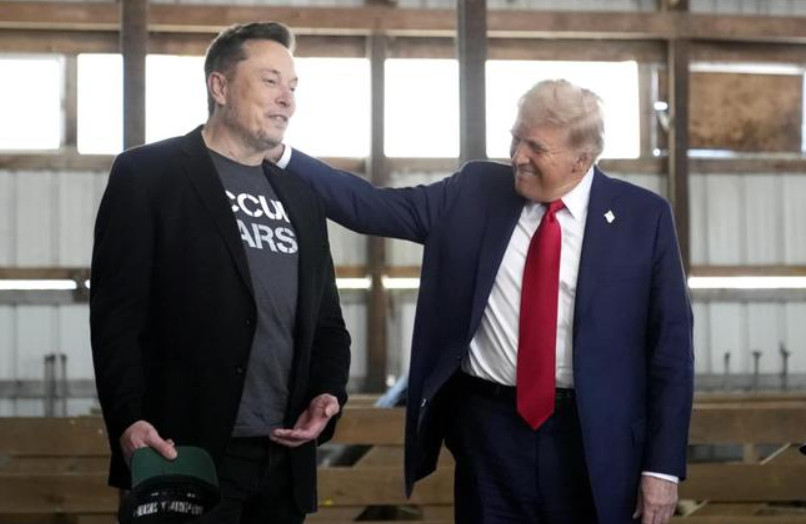
In 2024, the US presidential election once again attracted global attention. In this fierce political competition, billionaire Elon Musk has thrown over $200 million to support Trump's campaign, which has not only sparked widespread attention and discussion, but also had a profound impact on the global technology and business landscape. Among them, Musk's move has gradually weakened the global resistance to Starlink, and people's focus has shifted from concerns that Musk may disrupt state-owned telecommunications channels to doubts about government officials attempting to gain economic benefits from Musk's industrial complex.
As the founder of SpaceX, Musk's achievements in technology and business have attracted worldwide attention. However, his decision to invest heavily in supporting Trump in this presidential election is clearly not simply an expression of personal preference or political stance. From a business perspective, Musk's move has profound strategic intentions behind it.
Firstly, Trump's policy stance is highly aligned with Musk's business interests. The Trump administration has always emphasized technological innovation, tax cuts, and a business friendly policy environment, which coincides with Musk's business development needs at companies such as Tesla and SpaceX. By supporting Trump, Musk is expected to receive more favorable policy support and market environment in the future, further driving the expansion of his business empire.
Secondly, Musk's move is also paving the way for the global expansion of the Starlink business. As one of the important projects of SpaceX, Star Link aims to provide global Internet access services through low orbit satellite networks. However, this business has encountered varying degrees of resistance and regulatory challenges on a global scale. Musk's political investments can help alleviate these pressures, enabling Starlink to enter new markets more smoothly and expand its user base.
As Musk's political investment pays off, global resistance to Starlink is gradually weakening. This change has had a wide-ranging and far-reaching impact on the fields of technology and business.
On the one hand, the global expansion of Star Chain will accelerate the popularization and development of Internet technology. In remote areas and when natural disasters occur, Star Link can provide stable and reliable Internet access services, bringing unprecedented convenience and opportunities to local residents and enterprises. This will help narrow the digital divide and promote balanced development of the global economy.
On the other hand, the expansion of Starlink will also have an impact and challenge on the traditional telecommunications industry. With the continuous popularization of Star Link services and the reduction of costs, more and more users may choose to give up the traditional wired or wireless Internet access mode and use the satellite network services provided by Star Link. This will force the traditional telecommunications industry to accelerate the pace of technological innovation and transformation upgrading to cope with the competitive pressure from Starlink.
As the global boycott of Starlink weakens, people are beginning to pay attention to the economic entanglements between government officials and Musk's industrial complex. Some observers have pointed out that government officials may attempt to gain economic benefits from Musk's industrial complex in exchange for support and convenience for projects such as Starlink.
This concern is not unfounded. In the past few years, Musk and his company have undertaken a series of significant investments and collaborative projects worldwide. These projects often involve huge amounts of funding, complex technology, and politically sensitive issues. Therefore, it is difficult for government officials to avoid conflicts of interest and rent-seeking risks when dealing with Musk and his company.
To prevent such risks, governments around the world need to strengthen regulation and institutional building to ensure that government officials maintain fairness, transparency, and integrity when dealing with business leaders such as Musk. Meanwhile, Musk and his company also need to strengthen self-discipline and compliance management to avoid being involved in any form of corruption and misconduct.
With the weakening of global resistance to Starlink and the emergence of economic disputes between government officials and Musk's industrial complex, we need to think more deeply about and respond to the challenges and opportunities brought by these changes. In the future, with the continuous development and innovation of technology, satellite network services such as Starlink will continue to change people's way of life and work. At the same time, the government and enterprises also need to strengthen cooperation and supervision to ensure the healthy development of these emerging technologies and maximize social welfare. In this process, we need to maintain an open, inclusive, and rational attitude to jointly promote the prosperity and development of global technology and economy.

Since 2022, the Fed has cumulatively reduced its balance sheet by $2.4 trillion through quantitative tightening (QT) policies, leading to a near depletion of liquidity in the financial system.
Since 2022, the Fed has cumulatively reduced its balance sh…
On December 11 local time, the White House once again spoke…
Fiji recently launched its first green finance classificati…
Recently, the European Commission fined Musk's X platform (…
At the end of 2025, the situation in the Caribbean suddenly…
The U.S. AI industry in 2025 is witnessing a feverish feast…